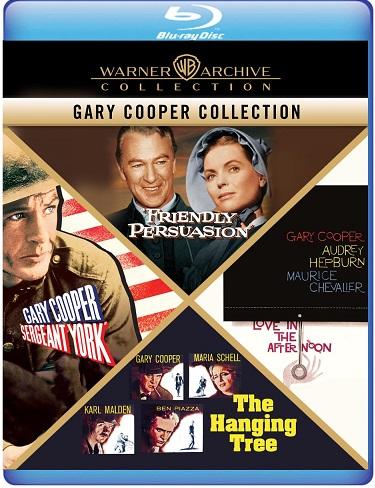Gary Cooper quartet
Gary Cooper 4-Film Collection (1941-1959, Warner Archive Collection, 4 Blu-rays, NR, 505 min.). The set includes “Sergeant York,” “Friendly Persuasion,” “Love in the Afternoon” and “The Hanging Tree.” Cooper won his first of two Academy Awards for playing Alvin C. York in the 1941 call-for-war film. Both “Sergeant York” – World War I -- and “Friendly Persuasion” – the Civil War – share many similarities, including a major character believing or raised in believing one should not kill his fellow man, but faces hostilities that force him to take such action. A look at each film follows.
“Sergeant York” (1941, 134 min.) begins with a lengthy exploration of Alvin C. York’s life in the Valley of the Three Forks of the Wolf in Tennessee’s Cumberland Mountains. Director Howard Hawks (“Red River,” “Rio Bravo,” “To Have and Have Not”) and the trio of screenwriters spend the first 69 minutes on York’s hard life farming the poorer “top land,” his initial rowdiness before his lightning storm finding of God and his attempts to woo Gracie Williams (Joan Leslie of “Yanky Doodle Dandy”) and buy better growing “bottom land.” A key role as Pastor Rosier Pile is played by Walter Brennan (“Red River,” “To Have and Have Not”).
Due to his religious conversion, York tries for conscientious objector status when it comes time to register for the draft, as war with Germany looms. That status is denied, so he reluctantly reports for duty at Camp Gordon in Georgia, where, due to his superb marksmanship, he is offered a promotion to colonel and the job of teaching the other recruits how to use a rifle. After a 10-day furlough back home, spent reading the Bible and a book on the history of the United States, he accepts the promotion.
One of the most fun scenes occurs at the Army camp, when York learns what a subway is from fellow recruit “Pusher” Ross (George Tobias of “The Set-Up,” “Silk Stockings”).
By the 95-minute mark, York and company have been sent over to France to fight the Germans. Here, York uses his skill in firing a rifle and his awareness of the proper way to approach a prey to single-handedly take out several German machine gun positions and capture 132 German soldiers. His justification was that the few he killed helped save hundreds, maybe thousands of lives. Another result was York became the most-decorated U.S. soldier of the war.
The battle scenes are excellent, lifting the film’s intensity, before all the hero’s welcoming that closes the film. The music is by the great Max Steiner. In all, the film earned five Oscar nominations, including Best Picture, Best Director and Best Supporting Actor (Brennan) and Supporting Actress (Margaret Wycherly, who played Mother York in rather stone-faced fashion).
Extras include audio commentary by film historian Jeanine Basinger; an entertaining look at raising and training lions at Gay’s Lion Farm in El Monte, California (9 min.); the Looney Tunes cartoon “Porky’s Preview,” directed by Tex Avery (6:50); and the Liam Neeson-narrated “Sergeant York: Of God and Country,” which details how York demanded that only Cooper portray him and includes remarks by Cooper’s daughter, Marie Cooper, as well as actresses Leslie and June Lockhart, who played York’s young sister Rosie (2006; 38:59; very good). Grade: film 3.5 stars; extras 3.25 stars
In "Friendly Persuasion” (1956, 137 min.), Gary Cooper plays Jess Birdwell, the head of a Southern Indiana Quaker family that includes strict wife Eliza (Dorothy McGuire of “Gentleman’s Agreement,” “A Tree Grows in Brooklyn”), one of the heads of their Quaker congregation; daughter Mattie (Phyllis Love), who secretly adores the next ranch’s Gard Jordan (Mark Richman of TV’s “Defenders of the Earth,” “Dynasty”); and sons Little Jess (Richard Eyer of “The 7th Voyage of Sinbad,” “The Invisible Boy”) and Josh (Anthony Perkins of “Psycho” and its three sequels, “Catch-22”).
While Eliza is very strict when it comes to living according to Quaker traditions, husband Jeff is a bit laxer. For example, on Sundays he likes to race his horse-drawn wagon against that of neighbor Sam Jordan (Robert Middleton of “The Court Jester,” “The Desperate Hours”), races that he always loses until he finds a faster horse during one of his sale tours.
In fact, an eventful day at the County Fair shows cracks in most of the Birdwells’ Quaker beliefs, as Mattie dances with Gard, Little Jess gambles (the 3 cup and one pea game), Josh fights and Dad plays music and buys an organ. The later has Eliza spend the night in the barn and the organ is then relegated to the attic.
More fun involves Little Jess and Eliza’s pet goose, who seem to always be at odds.
There is some amusement when Jeff and Josh, on their sales tour, encounter the widow Hudspeth (Marjorie Main of “Meet Me in St. Louis,” nine “Ma and Pa Kettle” films) and her equally man-starved daughters (Edna Skinner as Opal, Marjorie Durant as Pearl, Frances Farwell as Ruby).
The year is 1862 and the Civil War is raging. Gard has enlisted in the Union Army, while Josh is torn over enlisting as well, as the Quakers believe in no killing. Dad Jess is steadfast against killing, saying he would even help feed and house any Confederate soldiers that come to his farm.
With the Confederate Morgan’s Raiders approaching, and burning, looting and killing along the way, Josh makes his decision to join the town’s defense. This brings us into the three minutes of combat, with Perkins exceptional both during the battle and emotionally afterwards.
The film was directed by William Wyler (“The Best Years of Our Lives,” “Ben-Hur,” “Roman Holiday,” “Funny Girl”) and earned six Academy Award nominations, including Best Picture, Best Supporting Actor (Perkins), Best Director, Best Adapted Screenplay (blacklisted Michael Wilson), Best Sound Mixing (Gordon R. Glennon, Gordon Sawyer) and Best Original Song (Dimitri Tiomkin music, Paul Francis Webster lyrics). Tiomkin also scored the film, while Pat Boone sang the title song.
The sole extra is an NBC “Wide Wide World” TV segment, hosted by Dave Garroway, filmed at the Birdwell house set and including a rehearsal of a porch scene, which Garroway says is the first time a live outside camera was allowed on a film set (10:22). Grade: film 3.75 stars; extra 1.5 stars
“Love in the Afternoon” (1957, 130 min.) is mostly the tale of a virginal, young Parisian woman who yearns for romance. She is Ariane Chavasse (Audrey Hepburn of “My Fair Lady,” “Roman Holiday,” “Charade,” “Breakfast at Tiffany’s”), a cellist with a Parisian orchestra. Her best friend is fellow musician Michel (Van Doude of “Z,” “The Day of the Jackal”), who wants to date her, but is not romantic enough for her.
Ariane’s idea of romance comes from reading the divorce case files of her private investigator father, Claude Chavasse (Maurice Chevalier of “Gigi,” “The Merry Widow”), files she had been forbidden to dig into.
The first case we see Claude investigating is that of Monsieur X (John McGiver of “The Manchurian Candidate,” “Breakfast at Tiffany’s,” “Midnight Cowboy”), who is convinced his wife, Madame X (Lise Bourdin of “Dishonorable Discharge”), is cheating on him. In fact, she is and with renowned middle-age playboy Frank Flannagan (Gary Cooper, who does not show up until minute 27). Flannagan is an American into oil, Pepsi and beautiful women, who may or may not be married, even a pair of twins, in countries all over the world.
When Ariane hears her father report to Chavasse about his wife’s cheating and that Flannagan is the other man, Chavasse’s response is he is going to shoot Flannagan. Ariane then goes to Flannagan’s Ritz Hotel suite, sneaking in balcony to balcony from the next suite, to warn the man, who already had attracted her interest from all his love exploits in her father’s files.
Since she cannot sneak out at night, their future meetings are all in the afternoon. Part of Flannagan’s approach is to have sumptuous food served and the music group The Gypsies (played by themselves) perform for an hour, always ending with “Fascination.”
Ariane tells Flanagan that she lives with a man and plays with another man, meaning, but not saying, her father and Michel. As time progresses, Ariane starts making up former lovers, again using her father’s files for inspiration. Eventually, these other suitors start to bother Flannagan.
While supposedly nothing other than dancing ever occurred during these afternoon sessions, I was uncomfortable with their age difference, especially with Ariane being so young.
The film was written by director/producer Billy Wilder and I.A.L. Diamond, the first of their many collaborations. There are no extras. Grade: film 3 stars
Finally, there is a Gary Cooper Western, “The Hanging Tree” (1959, 107 min.), in which Cooper plays Dr. Joseph Frail, who moves back to Skull Creek on the Montana Gold Trail in 1873. He buys a house up on the hill for $500 and begins to see patients. The film is directed by Western veteran Delmer Daves (“Spencer’s Mountain,” “A Summer Place,” “The Last Wagon”), who shows an affinity for shots that look down from high places.
Based on a novella by Dorothy M. Johnson, a prolific writer of Western fiction who also wrote “The Man Who Shot Liberty Valance,” the film is an early example of a Western become a morality play.
The townspeople have not had much success finding gold, so when a man steals a nugget from a sluice near town, shots and cries of “sluice robber” break out. The would-be robber finds his way to Doc Frail, who himself has a dark past involving a burning house and two deaths. Frail treats him, but says the man’s payment is to become his servant for however long Frail wants. The younger man is Rune, played by Ben Piazza (“The Blues Brothers,” “The Bad News Bears,” “Mask”).
Frail likes to play poker in town and one night wins a gold claim. Meanwhile, he has an enemy in the town’s other “doctor” in George Grubb (George C. Scott of “Patton,” “The Hustler”). Tom Flaunce (Karl Swenson of “Vanishing Point,” “Judgment at Nuremberg,” “The Sword in the Stone”), a friend of Frail’s, owns the general store and the other house up on the hill.
Next, there is a stage coach robbery that goes bad. The sole survivor is Elizabeth Mahler (Maria Schell of “Superman,” “White Nights”) from Switzerland. She is not found for a couple of days and has severe sunburn of her face, rendering her temporarily blind. Frail treats her and houses her in Flaunce’s house, with Rune her guardian, as the male population is highly interested because she is described as a “looker.”
Meanwhile, our gambling doctor engages in a fist fight.
When Elizabeth recovers enough, she and Rune get a grubstake from Flounce – secretly financed by Frail – and buy into Frenchy Plante’s gold claim, 50-50. Plante is played by Karl Malden (“Patton,” “On the Waterfront,” “A Streetcar Named Desire”).
One can guess where things are headed, especially since the hanging tree, which Marty Robbins sings about in the title song, has yet to come into play. What was unexpected is how crazy the townspeople get when there is a gold strike, including burning furniture, ladders and, I believe, the public outside toilet facility.
The film received an Oscar nomination for the title song as Best Original Song, with music by Jery Livingston and lyrics by Mack David. There are no bonus features. Grade: film 3.25 stars
Rating guide: 5 stars = classic; 4 stars = excellent; 3 stars = good; 2 stars = fair; dog = skip it
Algiers (1938, Film Masters Archive Collection, Blu-ray, NR, 95 min.). The film, which was a Hollywood remake of the French classic “Pepe le Moko,” helped introduce sensation Hedy Lamarr to American audiences. Here, Lamarr (“Samson and Delilah,” “Come Live with Me”) plays Gaby, the Parisian woman visiting Algiers who draws the attention of wanted criminal Pepe le Moko, who has been hiding out in the crowded Casbah section of the city for two years. It was Lamarr’s first English language film.
Pepe is played by French actor Charles Boyer (“Gaslight,” “Hold Back the Dawn,” “Casino Royale”). Pepe is able to hide out in the Casbah, even though a local police inspector Slimane (Joseph Calleia of “Touch of Evil,” “The Jungle Book,” “Gilda”) not only knows where he is but actually occasionally hangs out with him, because it would be too difficult for the police to extricate him from the Casbah, which is described as “a melting pot for all the sins of the world” by one policeman. It is the city’s native quarter, rising like a fortress above the sea.
Pepe arrived in Algiers after fleeing from Paris, which he misses tremendously, with stolen jewels. In the Casbah, his often-neglected love interest is Ines (Sigrid Gurie of “The Adventures of Marco Polo”). That neglect will prove pivotal to the film’s ending. Meanwhile, a Parisian policeman has come to Algiers and demands Pepe be arrested. As the French cop and the team of 12 pursue Pepe through the Cashbah, cinematographer James Wong Howe juxtaposes high and low angle shots to great effect, with the use of shadows an early taste of the noir style that will fill the 1940s.
Pepe is not a monster – he even sings a song as he is falling in love -- and Slimane is not a hero.
Other characters include Pepe’s younger team member Pierrot (Johnny Downs of “College Holiday,” “Sing Another Chorus”), who is lured out of the Casbah in an attempt to trick Pepe from coming out, and Regis (Gene Lockhart of “His Girl Friday,” “Miracle on 34th Street,” “Carousel”), who sets the trap using ill-fated Pierrot in motion.
Oscar nominations went to Boyer as Best Actor, Lockhart as Best Supporting Actor, Wong Howe for Best Cinematography and Alexander Toluboff for Best Art Direction.
Extras include audio commentary by film historians Karie Bible and Roy Windham; and a 12-page booklet with notes by Windham. The film is said to have influenced everything from “Pepe Le Pew” cartoons to “Casablanca.” The Blu-ray will be released July 29. Grade: film 3 stars; extras 2 stars
Crumb Catcher (2023, Arrow Films, Blu-ray, NR, 102 min.). This film goes from absurd to thrilling. The title refers to the device bad guy John (John Speredakos of “Blackout,” “Wendigo”) is trying to get into production. The device, which truly no one would want, is a metal container with a brush so that restaurant diners can sweep up crumbs on their table themselves. John says it is to improve communication between the diners, as waiters would not interrupt them as much.
John was a waiter at the wedding reception of Shane (Rigo Garay of “Blackout,” “The Leech”) and Leah (Ella Rae Peck of “Bachelorette,” “The Call”). Shane is about to have a book he has written about his father published by the company Leah works for. Dad, by the way, was not invited to the wedding. The newlyweds are given access to a home owned by the publisher’s executive president for their honeymoon.
Shortly after they arrive at the isolated home, John shows up with their wedding cake, which had been presumed loss. Leah, of course, does not even want the cake and cannot figure out why Shane is willing to listen to John as he starts to introduce the crumb catcher. Well, the reason is John has a video of his wife Rose, the bartender at the reception who is sitting in his car outside, performing a sexual act on Shane. Lorraine Farris (“Follow Her”) plays Rose, who starts things toward violence, after John demands money to develop the crumb catcher and suppress the video.
The film closes with a highly entertaining, drunken car ride/chase. It was directed and co-written by Chris Skotchdopole (cinematographer for “Depraved,” camera department for 2009’s “The Taking of Pelham 123”). Also contributing to the writing were actor Garay and producer Larry Fessenden.
Extras include audio commentary by Skotchdopole; a making-of featurette (27:48); and two of the director’s earlier short films, “Camp Out” (2010) and “The Egg and the Hatchet” (2016). The insert booklet contains a note from producer Fessenden and writing on the film by Richard Newby and Tori Potenza. Grade: film 3 stars; extras 2.75 stars
About this blog:

My music review column, Playback, first ran in February 1972 in The Herald newspapers of Paddock Publications in Arlington Heights, IL. It moved to The Camden Herald in 1977 and to The Courier Gazette in 1978, where it was joined by my home video reviews in 1993. The columns ran on VillageSoup for awhile, but now have this new home. I worked at the Courier Gazette for 29 years, half that time as Sports Editor. Recently, I was a selectman in Owls Head for nine years.




























